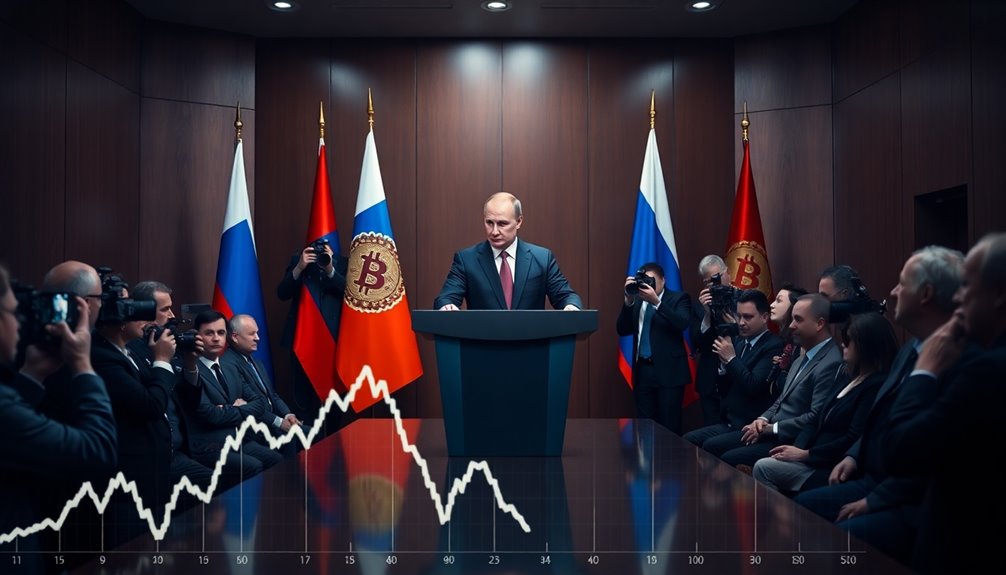Putin's recent embrace of Bitcoin signals a dramatic shift in global finance. By recognizing cryptocurrencies as property and exempting mining from taxes, he's paving the way for Russia to reduce dependence on the dollar. This move could help the nation navigate sanctions while curbing high inflation rates. As more countries eye crypto as a means for economic independence, the dollar's hold may weaken. This changing landscape hints at larger implications for global markets. If you want to understand how this plays out further, there's much more to explore regarding its economic impact.
Key Takeaways
- Putin's endorsement of Bitcoin positions it as a vital alternative to the U.S. dollar, potentially undermining dollar dominance in global finance.
- Recognizing cryptocurrencies as property in Russia legitimizes their use, facilitating broader adoption and investment in digital assets.
- Exempting crypto mining and sales from VAT enhances Russia's attractiveness for crypto businesses, fostering innovation and economic growth.
- The decentralized nature of Bitcoin allows countries to bypass Western sanctions, providing economic independence and stability amid financial restrictions.
- Increased regulatory scrutiny in the U.S. contrasts with Russia's crypto-friendly environment, further incentivizing nations to consider Bitcoin as a reserve asset.
Putin's Endorsement of Bitcoin

Putin's Endorsement of Bitcoin
In a bold move, Putin recently endorsed Bitcoin, emphasizing its unstoppable nature and likening its rise to the evolution of new technologies. He asserted that no one can ban Bitcoin or restrict the use of other electronic payment methods, highlighting the inevitability of digital currencies in the financial landscape.
By recognizing cryptocurrencies as property in Russia, he's taken significant steps to legitimize their use, exempting crypto mining and sales from value-added tax (VAT) and removing tax liabilities for electronic transactions. This legal framework is expected to accelerate digital asset adoption in Russia.
Putin's endorsement isn't just about innovation; it's a strategic response to geopolitical pressures, especially after Western nations froze $300 billion in Russian reserves. He sees Bitcoin as a tool to mitigate the impact of sanctions and reduce reliance on the dollar, especially as global discussions around cryptocurrencies for cross-border payments gain momentum.
Moreover, Bitcoin could help curb high inflation in Russia, currently nearing 9%. By encouraging investment in domestic infrastructure and alternative financial instruments, Putin aims to enhance Russia's financial autonomy and stability in an increasingly complex economic environment.
This endorsement marks a significant shift in how Russia views digital assets in the face of global challenges.
Shift in Economic Policy

Putin's endorsement of Bitcoin signals a broader shift in Russia's economic policy, reflecting the government's intent to adapt to current challenges. As the nation faces soaring inflation and a depreciating ruble, the Kremlin is reviving central planning reminiscent of Soviet-era Five-Year Plans. You'll notice an ambitious push toward large national projects, targeting technology, family welfare, and regional business development, all backed by a staggering 17 trillion rubles over six years. Additionally, the government plans to fund these initiatives through state financing, showcasing their commitment to economic revival.
However, the economic outlook remains grim. With growth forecasts slashed, and inflation at a 20-year high, everyday life is becoming increasingly difficult for Russians. The prioritization of military spending—expected to consume 40% of the 2025 budget—further strains domestic resources, impacting education and healthcare. As businesses teeter on the brink of bankruptcy, and basic goods become scarce, you might see a rise in black market activities. The Central Bank's struggle to stabilize the currency against high interest rates underscores the urgency of these economic reforms.
In this turbulent landscape, Bitcoin could emerge as a lifeline, reshaping how you view financial stability in Russia.
Recent Legislative Changes

You should pay attention to the recent changes in Russia's legislative landscape regarding cryptocurrencies.
Digital currencies are now classified as property, which brings specific tax incentives for both individuals and corporations. This shift not only affects how you might approach crypto investments but also sets the stage for more structured participation in the market. Additionally, the legal recognition of cryptocurrencies reflects Russia's commitment to financial innovation amid growing pressures from Western sanctions.
Crypto Property Classification
Recent legislative changes have considerably impacted how crypto assets are classified and regulated across various jurisdictions.
In Canada, for instance, crypto assets aren't inherently viewed as securities or derivatives; instead, their classification hinges on whether they meet the investment contract criteria outlined in the *Pacific test*. If a crypto trading platform (CTP) delivers assets immediately, it may bypass securities laws, as long as ownership and control transfer promptly. Moreover, the continuous emergence of new crypto assets necessitates clarity in legal classification.
However, registered CTPs must diligently assess the nature of these assets and halt transactions if regulators classify them as securities or derivatives. The Canadian Securities Administrators (CSA) provide essential guidance through Staff Notices, helping CTPs navigate this complex landscape.
In Russia, the classification of digital assets as property for taxation represents a significant shift. While exempt from value-added tax, these assets fall under income tax regulations, with varying rates based on earnings.
Miners in Russia face strict registration requirements, emphasizing the country's commitment to establishing a controlled environment for digital currencies.
Tax Incentives for Crypto
Tax incentives for cryptocurrency are becoming increasingly attractive, particularly for those looking to maximize their charitable contributions. By donating appreciated crypto, you can greatly improve your tax efficiency. Here's how:
- Avoid Capital Gains Tax: When you donate crypto that has increased in value, you sidestep the capital gains tax you'd incur if you sold it first.
- More Tax-Efficient: Donating crypto directly is generally more tax-efficient than selling it for cash and then donating the after-tax amount.
- Claim Deductions: You can claim a tax deduction based on the full market value of your crypto donation, which can be substantial. Additionally, knowing that charitable donations can offset capital gains tax can further enhance your financial strategy.
- Qualifying Nonprofits: Donations to registered 501(c)(3) nonprofits are eligible for these tax benefits, so your contributions can have a double impact.
Keep in mind that the IRS is tightening regulations, requiring exchanges to report crypto transactions more thoroughly starting in 2025.
As you navigate these changes, understanding the tax implications of your crypto donations can lead to considerable financial advantages.
Bypassing Sanctions With Crypto

As you explore how cryptocurrencies can help bypass sanctions, you'll notice their decentralized nature makes them less vulnerable to traditional financial restrictions.
With the ability to facilitate restricted transactions quickly and anonymously, crypto becomes an attractive option for those seeking alternatives. However, while this offers opportunities, it also comes with significant risks and challenges that you need to take into account. Additionally, the use of mixers and privacy wallets can further obscure transaction trails, complicating efforts to trace illicit activities.
Crypto as Sanction Evasion
Maneuvering the complexities of sanctions evasion, some countries are increasingly turning to cryptocurrencies as potential tools to bypass financial restrictions.
However, relying on crypto isn't without its challenges. Here are four key factors to weigh:
- Digital Trail: Every crypto transaction leaves a trace on the blockchain, making it easier for law enforcement to analyze and detect potential sanctions evasion. Additionally, advancements in blockchain analytics enable more effective tracking of these transactions.
- Limited Liquidity: The insufficient liquidity in crypto markets makes large-scale transactions risky, as they could attract unwanted attention and destabilize the market.
- Regulatory Scrutiny: Regulatory bodies like FinCEN and OFAC are actively monitoring crypto activities, issuing guidance to detect potential sanctions evasion. Additionally, the recent legalization of crypto mining in Russia aims to create a controlled environment for cryptocurrency, which could complicate enforcement efforts.
- Advanced Analytics: Blockchain analytics tools can identify patterns of illicit behavior, such as the use of mixers or privacy coins, further complicating the efforts of those trying to evade sanctions.
While cryptocurrencies may offer some degree of anonymity, their inherent transparency and the increasing regulatory oversight make them a less viable option for bypassing financial restrictions.
As a result, countries may need to rethink their strategies in the evolving landscape of digital finance.
Facilitating Restricted Transactions
Cryptocurrency is becoming a viable tool for countries looking to sidestep sanctions and engage in restricted transactions. As countries like Russia seek to reduce their dependence on the U.S. dollar, they're turning to digital assets to acquire goods and services that are otherwise restricted. By using cryptocurrencies, these nations can navigate around the influence of U.S. financial systems and facilitate transactions that might otherwise be prohibited. Additionally, the recent ruling regarding Tornado Cash's immutable smart contracts highlights the complexities of using decentralized technologies in this context.
However, engaging in transactions with crypto comes with risks. You must be aware that U.S. regulations prohibit dealings with Specially Designated Nationals (SDNs) and any entities closely tied to them. Even if you unknowingly transact with a crypto address later linked to an SDN, you could face legal consequences.
Furthermore, decentralized technologies, while offering anonymity, can complicate compliance. Mixing services and decentralized platforms may obscure transaction details, making it difficult to guarantee you're not inadvertently engaging in sanctioned activities.
As regulatory frameworks evolve, the challenge of enforcing compliance grows. You need to stay vigilant and informed about the changing landscape of crypto regulations to avoid potential pitfalls while exploring the opportunities that digital currencies present.
Global Financial Implications

While the implications of Putin's Bitcoin announcement are still unfolding, it's clear that the shift towards digital currencies could challenge the longstanding dominance of the US dollar.
As countries explore alternatives to traditional reserve currencies, the global financial landscape may soon undergo significant changes.
Here are some key financial implications you should consider:
- Decentralization: As Bitcoin gains traction, it offers an alternative to centralized currencies, potentially reducing reliance on the US dollar and euros. This aligns with the growing trend of AI-driven personalization in financial services, which caters to individual and institutional needs. Moreover, this shift mirrors the trend towards STEM toys that encourage critical thinking and problem-solving in children. Additionally, the rise of decentralized finance platforms can further democratize access to financial services.
- Sanction Resistance: Countries can use digital currencies to navigate Western sanctions, enhancing economic stability and facilitating cross-border payments. This aligns with Putin's assertion that Bitcoin cannot be banned, indicating its integral role in future financial systems.
- Reserve Diversification: Nations might start reducing their currency reserves in dollars, opting instead for Bitcoin as a viable store of value.
- Increased Economic Independence: The rise of cryptocurrencies could empower countries to establish their financial systems, minimizing the impact of external pressures.
In this evolving environment, the shift towards digital currencies isn't just a trend; it represents a fundamental reconfiguration of the global economy, inviting nations to rethink their financial strategies and priorities.
Establishing a Regulatory Framework

The rise of digital currencies like Bitcoin calls for a robust regulatory framework to guarantee stability and security in the financial system. FIT 21 is working to clarify the roles of the CFTC and SEC in overseeing digital assets. If a cryptocurrency operates on a decentralized blockchain, the CFTC will classify it as a commodity, while the SEC will handle securities. This division helps establish a clear jurisdictional oversight.
Consumer and investor protections are also a priority. Regulators focus on risks like fraud, cybersecurity, and market volatility, ensuring that false guarantees about crypto asset safety are avoided. By expanding Bank Secrecy Act requirements, FIT 21 aims to enhance compliance in the crypto industry. Additionally, the bill reflects growing regulatory interest as it seeks to provide regulatory clarity to enhance market stability.
State and federal regulators are collaborating to create a cohesive regulatory landscape. As regulated banking entities develop crypto infrastructure, licensing and chartering become essential.
With the DOJ's new National Cryptocurrency Enforcement Team in action, expect heightened scrutiny and enforcement against misuse of digital currencies.
In this evolving framework, clarity around compliance obligations is crucial, enabling firms to navigate the complex regulatory environment effectively. As you engage with digital currencies, understanding these regulations will be essential for informed participation.
Frequently Asked Questions
How Does Bitcoin Work as a Currency?
Bitcoin works as a currency by enabling you to send and receive value without intermediaries.
You create transactions using your wallet, signing them with your private key for security. These transactions get broadcasted to the network, where miners validate them through cryptographic processes.
Once confirmed on the blockchain, they become immutable.
With its fixed supply and growing adoption, Bitcoin offers a decentralized alternative to traditional currencies, making it a unique financial asset.
What Are the Risks of Investing in Bitcoin?
Investing in Bitcoin is like walking a tightrope; one misstep can lead to a fall.
You face user risks, such as irreversible transactions and lost passwords, which can render your funds inaccessible.
Regulatory uncertainties can create market volatility, while security threats loom from hacks and scams.
Additionally, Bitcoin's price can swing wildly, influenced by external factors.
How Does Bitcoin Mining Impact the Environment?
Bitcoin mining greatly impacts the environment.
You're looking at high energy consumption, using about 0.5% of global energy, comparable to Argentina. This results in millions of tons of carbon emissions annually, mainly from fossil fuels.
Additionally, the process generates substantial electronic waste due to the rapid obsolescence of mining hardware.
Can Other Countries Follow Russia's Cryptocurrency Strategy?
Yes, other countries can certainly follow Russia's cryptocurrency strategy.
By creating regulatory frameworks and allowing for crypto in international payments, nations can reduce reliance on traditional financial systems.
You'll see that countries facing sanctions or financial pressures may adopt similar measures to enhance economic stability.
Collaborating within groups like BRICS can also drive blockchain innovations, encouraging a shift towards alternative currencies that challenge the dominance of the U.S. dollar.
What Are the Future Trends for Bitcoin and Digital Currencies?
You might think Bitcoin's future looks grim, but it's actually poised for a wild ride.
With soaring institutional demand and regulatory support, you could see prices hitting $100,000 soon. As interest rates cool and innovations like DeFi gain traction, digital currencies are set to challenge traditional finance.
Sure, there'll be bumps along the way, but overall, the trend points toward greater adoption and market maturity, making it an exciting time to be involved.
Conclusion
In short, Putin's endorsement of Bitcoin isn't just a ripple; it's a tidal wave that could reshape the global economy. As Russia shifts its economic policy and embraces cryptocurrency, the implications for the dollar and international finance are monumental. With the potential to bypass sanctions and establish a regulatory framework, you need to pay attention. This isn't just a trend; it's a revolution that could leave traditional financial systems scrambling for relevance.











